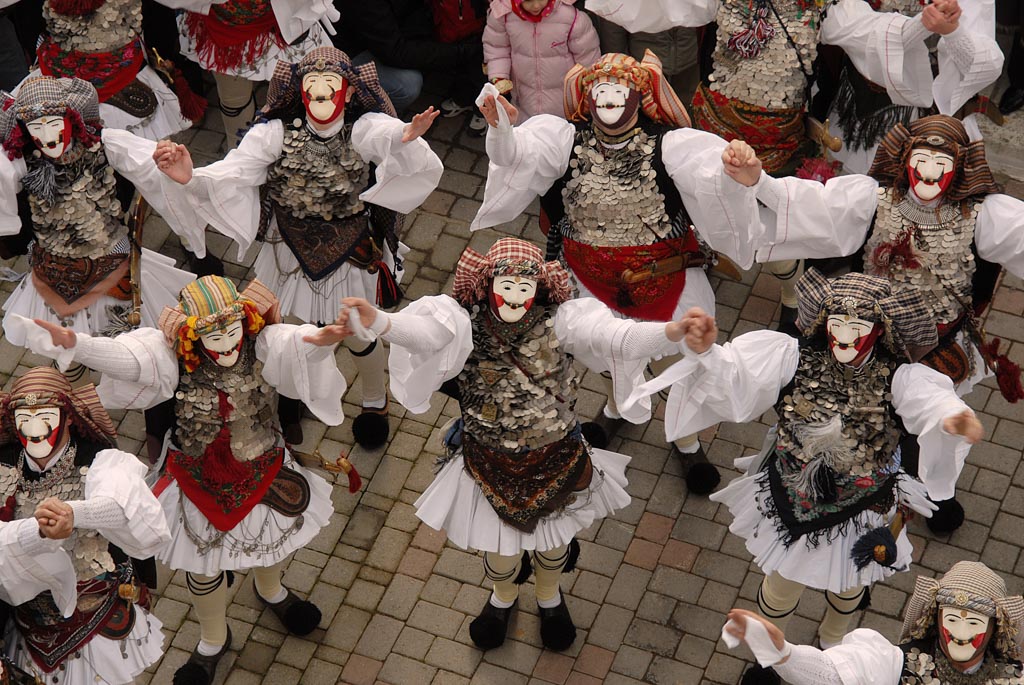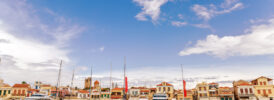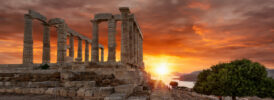As winter ebbs and the trees start to blossom, a season of festivity begins. Millennia ago, this was the season of the “Dionysia” – celebrations dedicated to the Ancient Greek god Dionysus – a god of many things that go well together: orchards and fruit, vegetation, fertility, and festivity. He is also the god of insanity, ritual madness, religious ecstasy, theater, and of course – wine. The Dionysia celebrate the earth waking up from a winter’s sleep. It’s also a celebration of freedom – a season of sweet Dionysian abandon.
How does this fit in with Christianity though? The season of Dionysia precedes the season of Lent- the period of fasting and sobriety that precede the celebration of Easter. The Dionysia – still a time of revelry – has a new name: Apokries = ‘apo’ (from, away from) + ‘kreas’ (meat) – a farewell to meat before the season of lent.
The Greek Carnival – Apokries – is celebrated in all corners of Greece, but some regions have a special twist, unique customs and traditions that make their Apokries festivities stand out. Here are some of the most fascinating.
Naoussa- the Genitsari and Boule
The roots of the unique Apokries carnival celebrations are complex. Naoussa, a beautiful city in northern Greece that is known for excellent wine, has a brave history. The citizens engaged in an uprising against the Ottomans in 1822, just one year after the Greek war of Independence was begun. The Ottoman reprisal was swift and severe. The traditional carnival songs of Naoussa commemorate the atrocity but also celebrate the noble, fighting spirit of their ancestors.
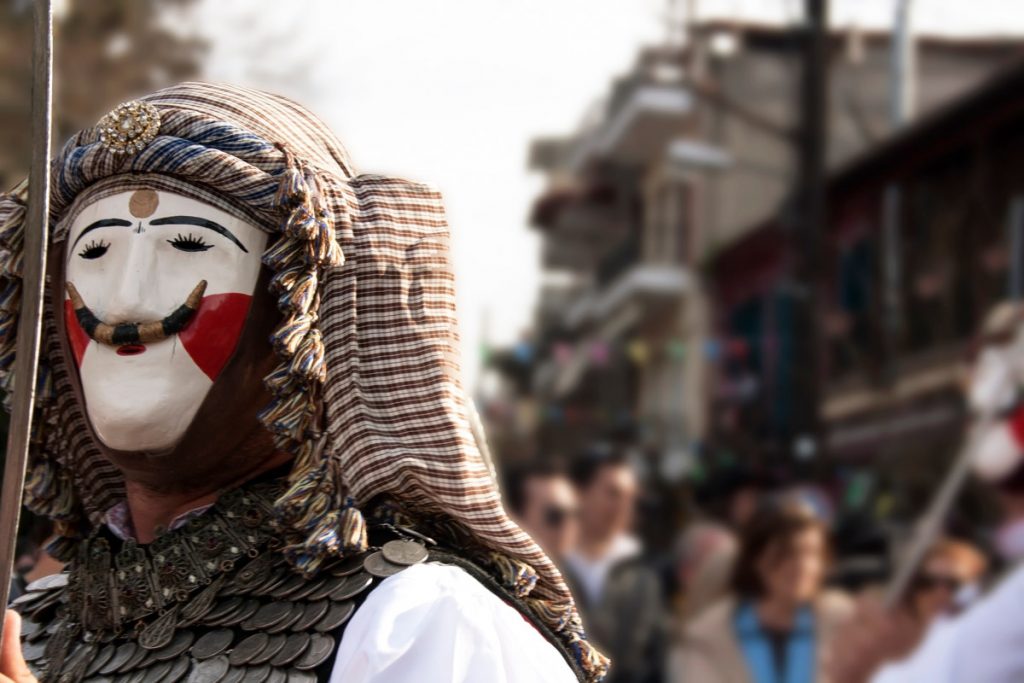
Young unmarried men don elaborate costumes featuring a Greek ‘fustanella (the kilt-like garment of the freedom fighters) and striking masks- called “Prosopa” (‘face’ in Greek). This transforms them into the “Genitsari”. Their dance/procession takes an ancient route through the town. Swords are brandished in a stunning display. The one Boule – the ‘bride’ – is also a man in disguise. The festivities combine the Dionysian abandon with commemorating the city’s unique and brave history.
Kastoria – the Ragoutsaria
Kastoria’s unique carnival festivities begin much earlier than those of other regions – starting right after the Epiphany (January 6th). Various groups of men and women of all ages, organized in groups rather like teams, each have their own traditional costume and orchestra. The streets are filled with celebration, culminating on January 8, in the Medieval square of Doltso, when a competition of exuberance begins- the groups try to ‘outsing’ each other – singing louder and better than the others.
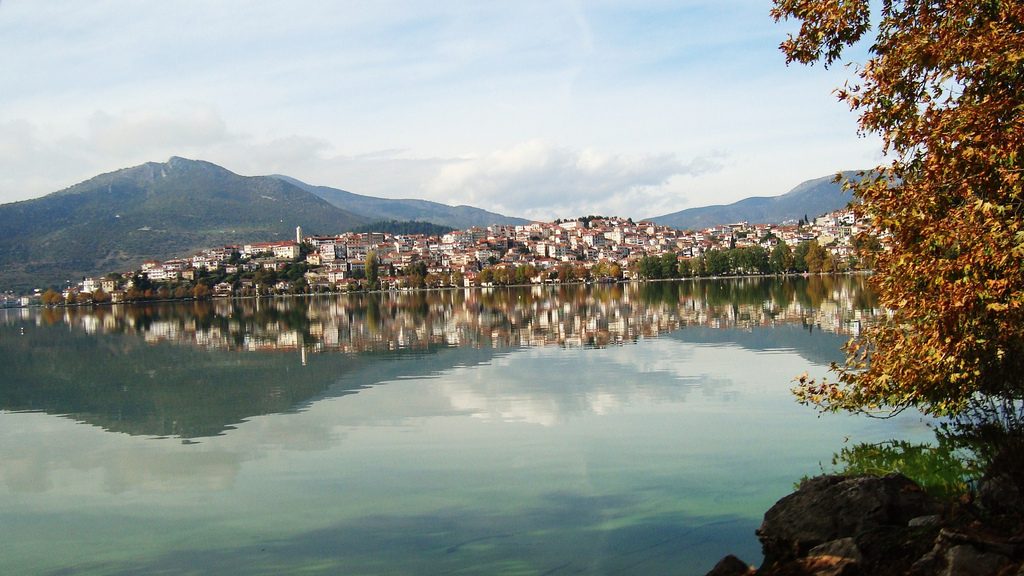 Why the name “Ragoutsaria”? Many propose that the name has its origins in the Latin word “rogatores” – a beggar. This makes sense, based both on the popular costumes and on another tradition- the Rogatores go door to door asking for gifts, in exchange for which they chase away the evil spirits.
Why the name “Ragoutsaria”? Many propose that the name has its origins in the Latin word “rogatores” – a beggar. This makes sense, based both on the popular costumes and on another tradition- the Rogatores go door to door asking for gifts, in exchange for which they chase away the evil spirits.
Serres – the Babogeros
There is another way to drive the evil spirits away in Serres! The Babogeros – ideally one in each family – is a young man in a terrifying-looking costume of black or crown goatskin, a very tall hat decorated with ribbons and beads, and above all, he is covered with bells of every size. Departing from his house with his mother’s blessing, he joins the others, all dancing and making as much noise as possible to scare the evil spirits, driving them away from the village. At the same time, the bells wake up nature, and usher in health and prosperity.
Galaxidi – the Flour War
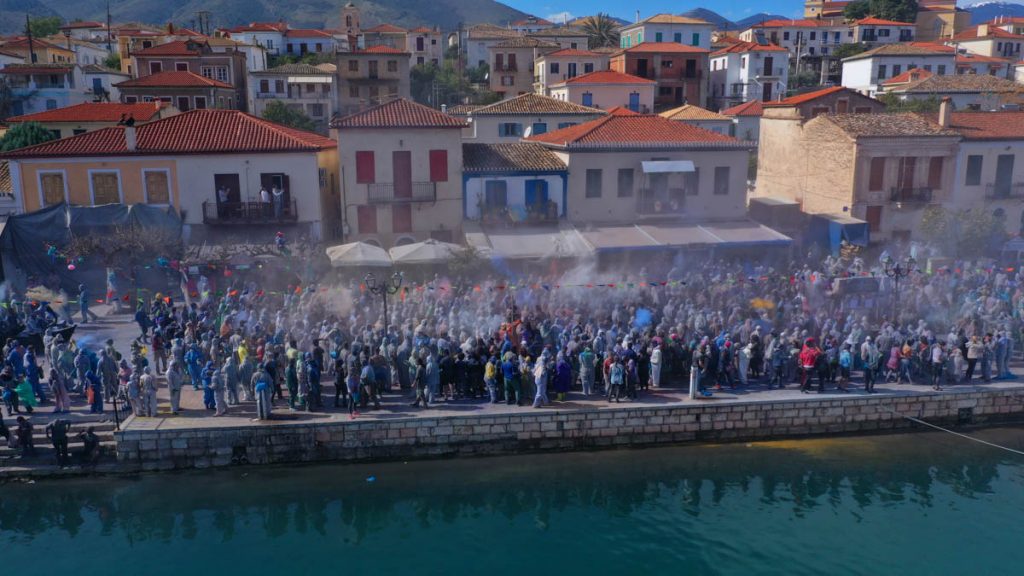
Now our tour of Apokries customs brings us further south, to the northern shores of the Gulf of Corinth and the beautiful town of Galaxidi. Carnival season here concludes on Clean Monday with, ironically, actually a very, very messy celebration – the “Aleuromoutzouromata” = “alevri” (flour) = “moutzouromata” (smudges). With its origins in the Byzantine era- some say from the painted faces of the clown in the Hippodromes – or possibly brought over by sailors who had seen similar colorful festivities in Sicily – men would throw flour at one another, making merry jokes. In time, color was added to the flour – ochre, indigo. And women also joined in the fun. Now, people of all ages participate in this messy, joyous celebration. Some wear a protective overall over their clothing, and a simple face mask and even goggles are advised for those who want to really throw themselves into the fray. The result is some good “clean” fun- a joyous Clean Monday celebration to cap off the season of Apokries.
Have you joined any Apokries celebrations in Greece?

